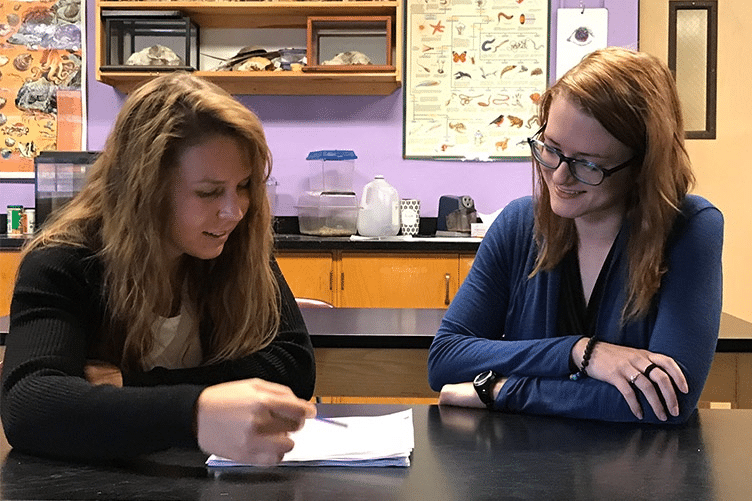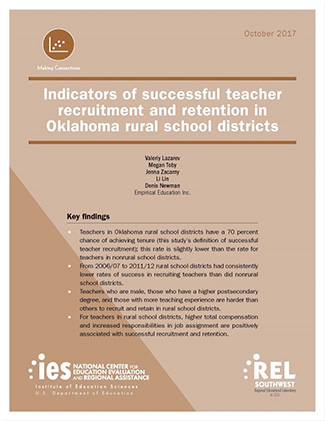05 Apr2019
By Bryan S. Zugelder
 As co-editors, we are seeking chapter authors for a book we are publishing with IGI Global for release in 2020 titled Handbook of Research on Leadership and Advocacy for Children and Families in Rural Poverty. This interdisciplinary book will address issues related to education, counseling, social work, public policy, health, and leadership.
As co-editors, we are seeking chapter authors for a book we are publishing with IGI Global for release in 2020 titled Handbook of Research on Leadership and Advocacy for Children and Families in Rural Poverty. This interdisciplinary book will address issues related to education, counseling, social work, public policy, health, and leadership.
Education researchers and practitioners are invited to submit a 1,000 to 2,000 word chapter proposal by April 25, 2019. All submitted chapters will undergo a double-blind review.
31 Jan2019
By Beth Fornauf

This article and photo originally appeared in UNH Today and are reprinted with permission.
When Kayla Croteau earned her master’s in secondary education from UNH in 2015, she never imagined that she was only three short years away from another teacher education experience — this time as a teaching mentor for the University of New Hampshire’s Teacher Residency for Rural Education (UNH-TRRE) program.
UNH-TRRE, designed to prepare elementary and secondary math and science teachers to work in rural, high-need New Hampshire schools, is working with its second cohort of future teachers. These UNH students, known as teaching residents, live, learn, teach and volunteer in rural New Hampshire communities over the course of the 15-month master’s program.
Croteau serves as a UNH-TRRE teaching mentor to Alexzandria Steiner, a native of St. Johnsbury, Vermont, and current teaching resident in the TRRE program. Steiner, who is seeking secondary certification in life sciences, works with Croteau at Groveton High School, one of the UNH-TRRE partnership schools in Coӧs County.
Teaching residents, embedded in the areas in which they will teach, make connections with local families and begin to identify assets and resources each rural community has to offer.
11 Dec2018
By Katrina Norfleet
The University of Idaho (UI) has received a nearly $1 million grant from the U.S Department of Education to support the second cohort of its Indigenous Knowledge for Effective Education Program (IKEEP), which prepares and certifies culturally responsive Indigenous teachers to meet the unique needs of Native American students in K-12 schools. The first IKEEP cohort began in 2016 with nine students. The new grant will allow an additional eight scholars to begin training in the summer of 2019.
“I am so very pleased that the University of Idaho’s College of Education, Health & Human Sciences (CEHHS) is home to the IKEEP program,” said CEHHS Dean Ali Carr-Chellman. “This U.S. Department of Education grant will help some of our highest needs schools in the state of Idaho to have not only highly qualified teachers, but teachers with a clear sense of culturally responsive curricular approaches. I am deeply impressed by the dedication and perseverance of Drs. Vanessa Anthony-Stevens and Yolanda Bisbee in their pursuit of the IKEEP program for the betterment of all of Idaho.”
Anthony-Stevens and Bisbee, along with Christine Meyer and Joyce McFarland recently shared insights into the IKEEP model in the following Q&A:
07 Sep2018
By Jerrica Thurman

Check out the September/October 2018 issue of the Journal of Teacher Education (JTE). It is now available online and hitting desks around the country. See what Volume 69 Number 4 has to offer!
27 Oct2017
By Renée A. Middleton

The evolution of a teacher candidate into a professional educator does not occur overnight. Rather, it is a slow, steady, empowering journey that unfolds over several years, with teacher candidates receiving support and encouragement from mentor teachers and university faculty alike. Through it all, teacher candidates learn just as many lessons as they teach, ideally with one overarching principle repeatedly impressed upon them: that they must serve all learners.
This is no small task, as today’s educators enter increasingly diverse schools. This diversity creates wonderful learning opportunities for all, but it also presents its fair share of challenges. Teachers will encounter students with disabilities. They will encounter students who are gifted and talented. They will encounter students from low-income families. They will encounter students from various racial, ethnic, and socioeconomic backgrounds, as well as students who do not speak English as a first language.
16 Oct2017
By Zachary VanHouten

A new study from the Institute of Education Sciences (IES) Regional Educational Laboratory Southwest has reaffirmed many of the challenges related to recruiting and retaining educators in rural areas. The report, Indicators of Successful Teacher Recruitment and Retention in Oklahoma Rural School Districts (download PDF here), examines data spanning a decade in Oklahoma districts, more than 70% of which are rural.
The analysis finds that two key influences on teacher retention are compensation and teachers’ level of responsibility at their school. Numerous other factors affecting retention are catalogued in the appendices of the report, organized into categories of teacher, district, and community-based variables. Educator preparation programs that collaborate with rural districts may want to review the study’s findings for insights that might be applied to their own local challenges.
14 Feb2017
By Allen Pratt
The author is chair of AACTE’s newly formed “Preparing Teachers for Rural Schools and Communities” topical action group. The views expressed in this post do not necessarily reflect the views of AACTE.
Rural schools and communities may appear as little more than blips on a map, known perhaps for their relaxed pace of life but largely anonymous to the rest of the world. In reality, though, these communities are a critical thread that holds our country together, and preparing educators for the unique needs of rural students and schools is a vital task.
24 May2016
By Deborah Koolbeck
The U.S. Department of Education has announced a new competition for the Teacher Quality Partnership (TQP) grant program. After consultations with tribal communities and officials, the Department has designed this grant cycle to focus on improving the outcomes of students in tribal and rural populations.
For this competition, the Department expects to award three to five grants averaging $1 million each. Interested parties have until June 22 to submit their notice of intent to apply; completed applications are due by July 7.
18 Apr2016
By Shelly Meyers
It is no secret that South Carolina has faced many challenges related to education. Most recently, a shortage of teachers has been severely affecting the most vulnerable regions of South Carolina: our rural and poverty-stricken regions. In a state where most students live below the poverty level, there are some unsung heroes doing their best with the lowest of means, but we desperately need to improve our recruitment and retention of professional educators.
One way the state is supporting this goal is through Proviso 1A.73, also known as the Rural Teacher Recruiting Incentive. The FY16 budget allows for $1.5 million to be spent on this plan. The Center for Educator Recruitment, Retention, and Advancement (CERRA) at Winthrop University along with the South Carolina Department of Education and the Education Oversight Committee has been charged with the responsibility to develop the initiative, and CERRA Executive Director Jane Turner submitted the plan for the first year in January 2016 with multiple components:
 As co-editors, we are seeking chapter authors for a book we are publishing with IGI Global for release in 2020 titled Handbook of Research on Leadership and Advocacy for Children and Families in Rural Poverty. This interdisciplinary book will address issues related to education, counseling, social work, public policy, health, and leadership.
As co-editors, we are seeking chapter authors for a book we are publishing with IGI Global for release in 2020 titled Handbook of Research on Leadership and Advocacy for Children and Families in Rural Poverty. This interdisciplinary book will address issues related to education, counseling, social work, public policy, health, and leadership.









